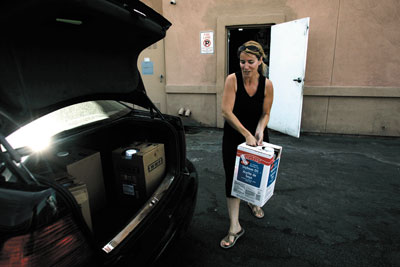Greased Lightning
Mary Beth Horiai needs to put oil in her car. So she's driving to a restaurant.
A dozen five-gallon jugs await her arrival at Island Sushi at 9400 S. Eastern Ave. Horiai's 2002 Volkswagen Jetta runs on their contents: vegetable oil.
"We like the idea that we're reducing our carbon footprint and running our car on an item that's treated as garbage," says Horiai, a 46-year-old events organizer for the U.S. Green Building Council.
"The more I study, the more I realize what kind of crisis we're in and what we need to do to change," she adds. (According to the Web site energybulletin.net, cars running on vegetable oil produce less carbon monoxide and fewer unburned hydrocarbons and particulates. In addition, their sulfur output is close to zero.)
The part where Horiai has driven more than 1,600 miles since she last paid for fuel isn't bad, either.
"We love not paying gas prices," she says. (Horiai shares the car with her daughter, Mikki, a University of Nevada, Las Vegas student.)
Only diesel vehicles can be converted to veggie oil. But any diesel will do. (The diesel engine was originally intended to burn peanut oil.) A second fuel tank needs to be installed in the trunk, along with a separate filter and fuel lines. The coolant system also needs modifying, so it can transfer the engine's heat to the new components.
Conversion kits cost about $1,500 online, and $500 to have installed. Horiai's kit is made by Easthampton, Mass.-based Greasecar. Similar systems are made by companies called Golden Fuel Systems, Plantdrive and Frybrid.
"It drives exactly the same," Horiai says as she turns right onto Eastern Avenue.
Indeed, there are only two decipherable driving differences. One is the glowing red button behind the gear shift.
"This switches it over from diesel to veggie oil," Horiai explains.
Diesel must be used to start the engine and warm it up for about five minutes before switching to vegetable oil. And before the car is shut off, diesel must enter the engine again, to prevent the vegetable oil from congealing in the pipes.
The other difference is stranger: the slight aroma of shrimp tempura.
"I don't smell anything," Horiai says. "But I'll take your word. At least it's better than the smell of diesel."
Horiai was introduced to veggie cars via a 2004 KVBC-TV, Channel 3 news segment produced by Nick di Archangel, who built his own and regularly reported on its progress. (He bought a 1991 Jetta with 181,000 miles on it and drove it for another 40,000 after installing a Greasecar kit. Now, di Archangel drives a veggified 2003 Jetta.)
"There's a sense of freedom that you never imagined," said di Archangel, who has since become the public information coordinator for the Las Vegas Regional Transportation Commission. "If I say to my kids, 'Let's go to Disneyland this weekend,' I don't have to think about $80 to $90 coming out of the budget."
Di Archangel estimates there are 10 to 15 veggie cars registered in the valley, plus six vans run by a bicycle touring company called Escape Adventures. One converted 2007 Jetta is owned by Jenna Morton, co-owner of the N9NE Group, who feeds it with waste veggie oil from her properties the N9NE Steakhouse, ghostbar, Rain, Moon, Nove Italiano and the Playboy Club.
"I think it's a great way to show an alternative to fossil fuel," Morton said.
There are drawbacks to the conversion, however. For one, it voids nearly all car manufacturer warranties.
"Someone who has never worked on a car can drive one of these," di Archangel said. "But it would be a good idea to be friendly with a mechanic." (Both Horiai and Morton supply di Archangel with waste vegetable oil, in exchange for his help with their cars.)
And procuring the waste vegetable oil -- which must be filtered to remove impurities -- can be a big headache.
"Whenever someone asks me about doing this, I tell them, 'Don't even look for a car until you find a restaurant,' " di Archangel said. "You're just going to be frustrated."
Although tens of thousands of gallons of waste vegetable oil are produced by Las Vegas eateries each day, most of it is already spoken for.
"If they're not getting paid for it, then they're doing something wrong," said Leo Quintana, plant manager for Darling International, one of three local companies paying 5 to 15 cents per gallon for the vegetable oil.
Quintana said his company's clients include the Sonic and Popeye's chains, and 10 "major casinos" that he declines to name. Darling processes the grease, removing water and impurities, then resells most of it to animal feed houses in Utah for 36 to 38 cents per gallon.
"Some customers we charge because they're in the boonies and they're not big grease producers," Quintana says. "But even if they're not selling it to us, they want professionals to pick it up without causing problems."
The biggest concern, Quintana says, is liability.
"If someone spills it in the street, a hazmat team has to come down," he said. "And if it gets into a storm drain, the city is going to make you wash the whole storm drain out, and they're gonna make sure a big company does it and charges you."
Of course, fresh vegetable oil also can be used. But that runs about $8 per gallon at Costco. And diesel, which all veggie cars can also run on, averages 50 cents to $1 more per gallon than gasoline.
"We're just coming to get the oil!" Horiai yells into the open back door. (Horiai and her husband, a sushi chef, used to own Island Sushi, so they arranged with the new owner to continue their pipeline.)
A chef points out where the jugs are stacked, and Horiai begins five trips to her open trunk and back.
Later this week, Horiai will run the oil over to di Archangel. He'll pour it through socklike filters sold by Greasecar for $6 each, then give the treated WVO back to her (minus his cut).
"It takes some work," Horiai says. "It's not an easy thing.
"But we're going to continue doing it as long as it makes sense for us."
Contact reporter Corey Levitan at clevitan@ reviewjournal.com or 702-383-0456.




























